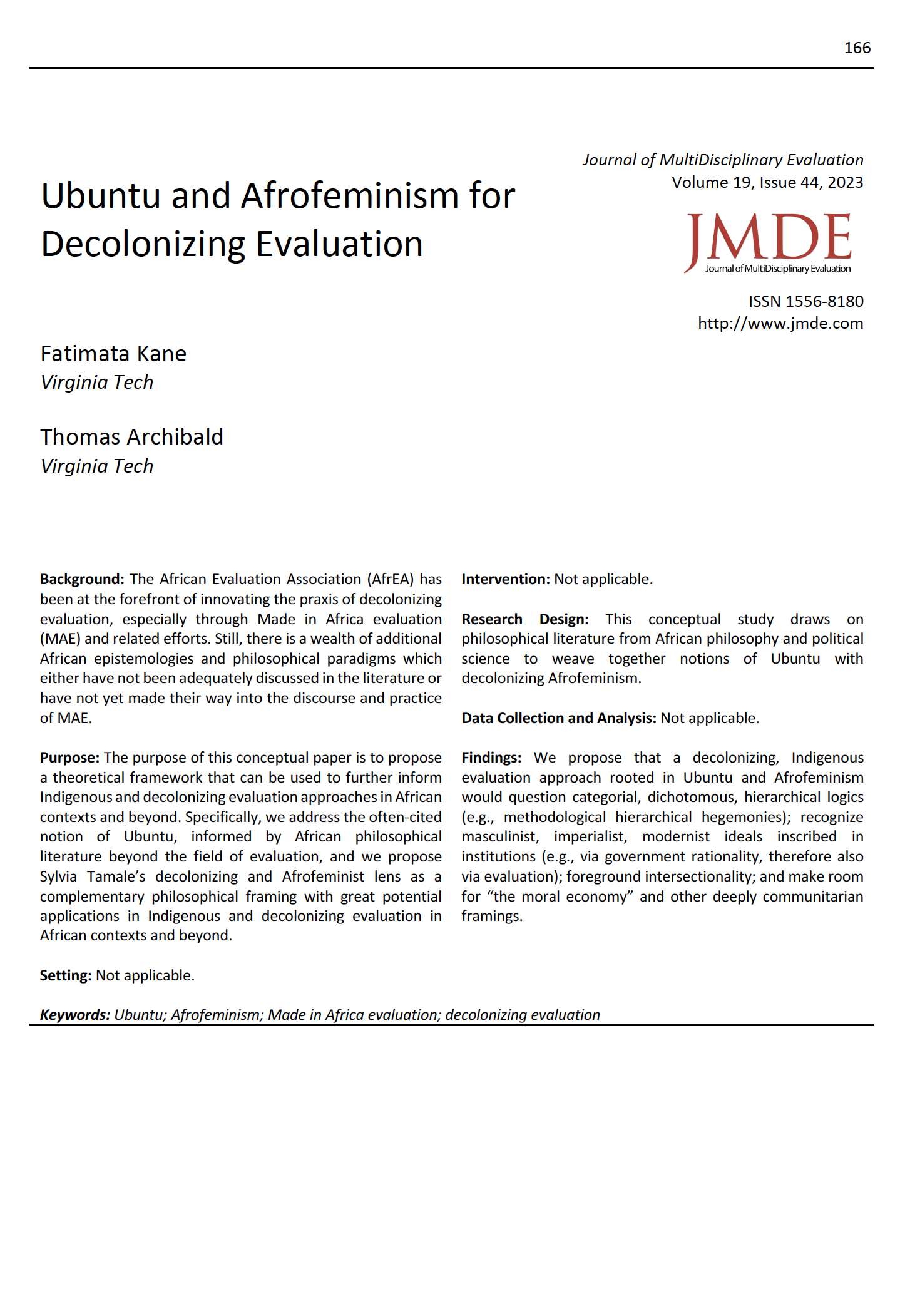Ubuntu and Afrofeminism for Decolonizing Evaluation
Main Article Content
Abstract
Background: African evaluation has been at the forefront of innovating the praxis of decolonizing evaluation, especially through ‘Made in Africa Evaluation’ (MAE) and related efforts. Still, there is a wealth of additional African epistemologies and philosophical paradigms which either have not been adequately discussed in the literature, or have not yet made their way into the discourse and practice of MAE.
Purpose: The purpose of this conceptual paper is to propose a theoretical framework that can be used to further inform indigenous and decolonizing evaluation approaches in African contexts and beyond. Specifically, we address the often-cited notion of ubuntu, informed by African philosophical literature beyond the field of evaluation, and we propose Sylvia Tamale’s decolonizing and Afro-feminist lens as a complementary philosophical framing with great potential applications in indigenous and decolonizing evaluation in African contexts and beyond.
Setting: Not applicable.
Intervention: Not applicable.
Research Design: This conceptual study draws on philosophical literature from African philosophy and political science to weave together notions of ubuntu with decolonizing Afro-Feminism.
Data Collection and Analysis: Not applicable.
Findings: We propose that a decolonizing, indigenous evaluation approach rooted in Ubuntu and Afro-Feminism would: question categorial, dichotomous, hierarchical logics (e.g., methodological hierarchical hegemonies); recognize masculinist, imperialist, modernist ideals inscribed in institutions (e.g., via government rationality, therefore also via evaluation); foreground intersectionality; and make room for “the moral economy” and other deeply communitarian framings.
Downloads
Article Details

This work is licensed under a Creative Commons Attribution-NonCommercial 4.0 International License.
Copyright and Permissions
Authors retain full copyright for articles published in JMDE. JMDE publishes under a Creative Commons Attribution-NonCommercial 4.0 International License (CC BY - NC 4.0). Users are allowed to copy, distribute, and transmit the work in any medium or format for noncommercial purposes, provided that the original authors and source are credited accurately and appropriately. Only the original authors may distribute the article for commercial or compensatory purposes. To view a copy of this license, visit creativecommons.org
References
Chilisa, B. (2012). Indigenous research methodologies. Sage.
Chilisa, B. (2015). A synthesis paper on the Made in Africa evaluation concept commissioned by the African Evaluation Association (AfrEA).
Chilisa, B., & Mertens, D. M. (2021). Indigenous Made in Africa Evaluation frameworks: Addressing epistemic violence and contributing to social transformation. American Journal of Evaluation, 42(2), 241-253.
Chilisa, B., Major, T. E., & Khudu-Petersen, K. (2017). Community engagement with a postcolonial, African-based relational paradigm. Qualitative Research, 17(3), 326-339.
Cloete, F. (2016). Developing an Africa-rooted programme evaluation approach. African Journal of Public Affairs, 9(4), 55-70.
de Sousa Santos, B. (2014). Epistemologies of the South: Justice against epistemicide. Paradigm Publishers.
Frierson, H., Hood, S., & Hughes, G. (2002). A guide to conducting culturally responsive evaluation. In J. F. Westat, The 2002 user-friendly handbook for project evaluation (pp. 63-73). National Science Foundation.
Hood, S., Hopson, R. K., & Kirkhart, K. E. (2015). Culturally responsive evaluation. In K. E. Newcomer, H. P. Hatry, & J. S. Wholey (Eds.), Handbook of practical program evaluation (pp. 281-317). Wiley.
Imam, A. (1997). Engendering African social sciences: An introductory essay. In A. Imam, A. Mama, & F. Sow (Eds.), Engendering African social sciences (pp. 1-30). Codesria.
Lloyd, A. S. (1972). Freire, conscientization, and adult education. Adult Education, 23(1), 3-20.
Lorde, A. (1984). Sister outsider: Essays and speeches. Crossing Press.
Louw, D. J. (1998). Ubuntu: An African assessment of the religious other. The Paideia Archive: Twentieth World Congress of Philosophy, 23, 34-42. https://doi.org/10.5840/wcp20-paideia199823407
Lugones, M. (2010). Toward a decolonial feminism. Hypatia, 25(4), 742-759.
Mertens, D. M. (2009). Transformative research and evaluation. Guilford.
Omosa, O., Archibald, T., Niewolny, K., & Stephenson, M. (2021). Towards defining and advancing “Made in Africa Evaluation.” African Evaluation Journal, 9(1), a564. https://doi.org/10.4102/aej.v9i1.564
Smith, L. T. (2012). Decolonizing methodologies: Research and indigenous peoples (2nd ed.). Zed Books.
Tamale, S. (2020). Decolonization and Afro-feminism. Daraja Press.
Uwizeyimana, D. (2020). UBUNTU and the challenges of Africa-rooted public policy evaluation approach. Journal of African Foreign Affairs, 7(3), 113-129.
Wallis, S. E. (2019). Improving our theory of evaluation through an African-made process. Administratio Publica, 27(4), 275-291.
Zulli, R. A., & Frierson, H. T. (2004). A focus on cultural variables in evaluating an Upward Bound program. New Directions for Evaluation, 102, 81-93.

